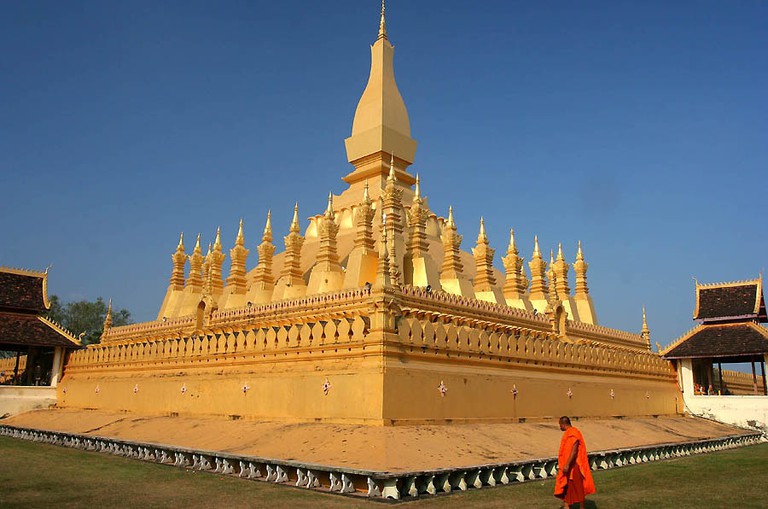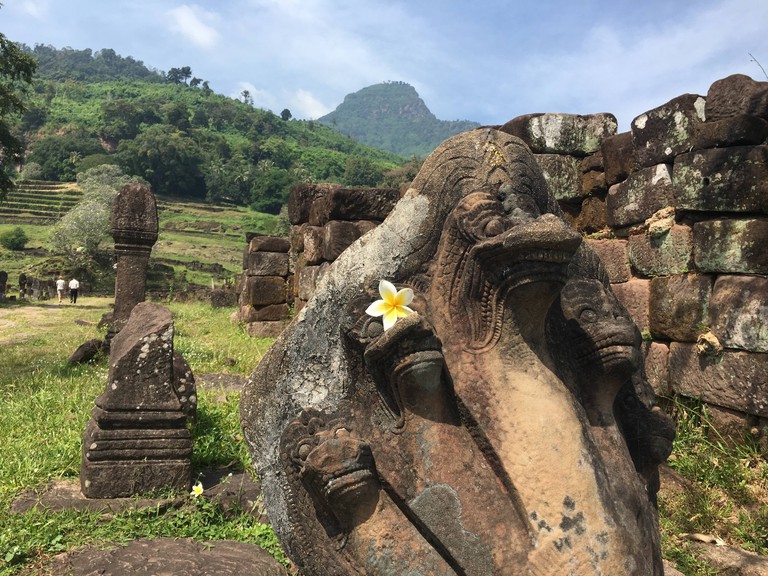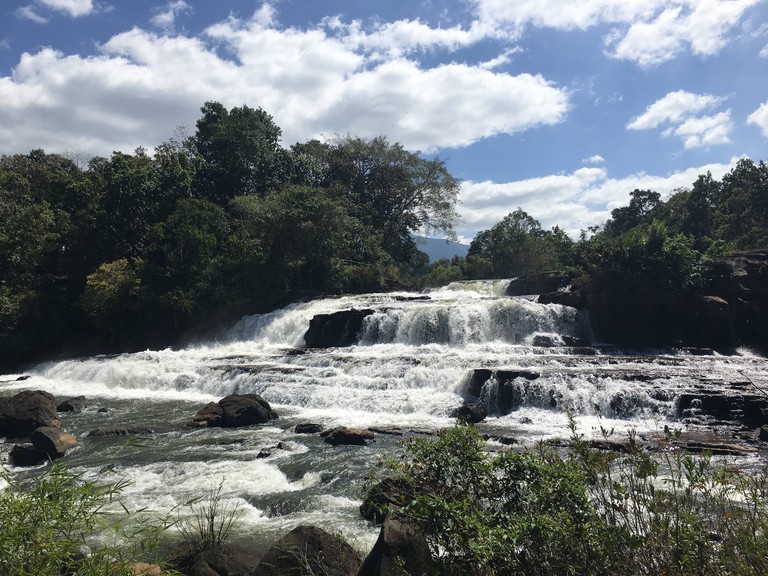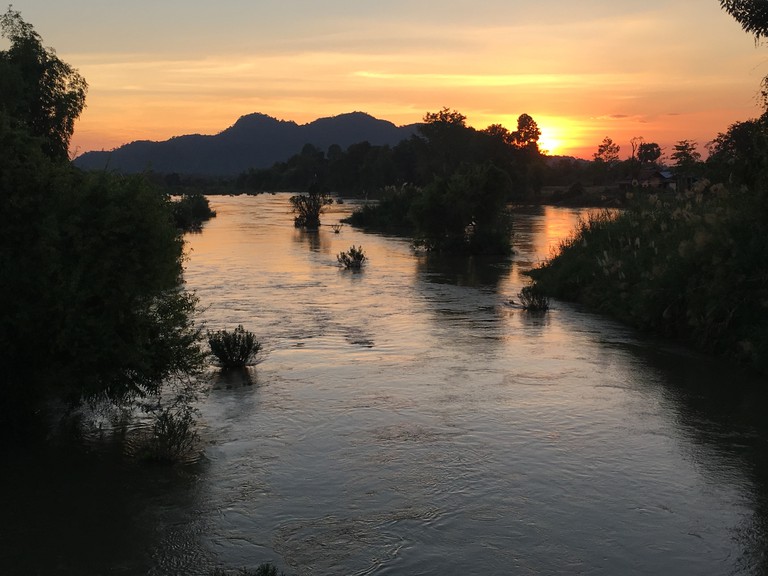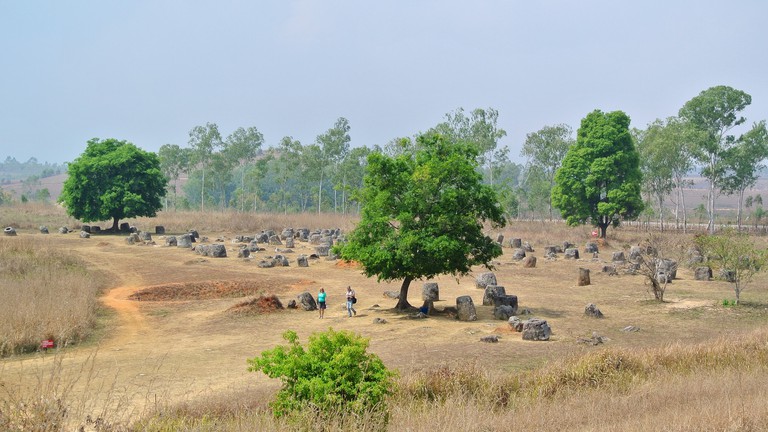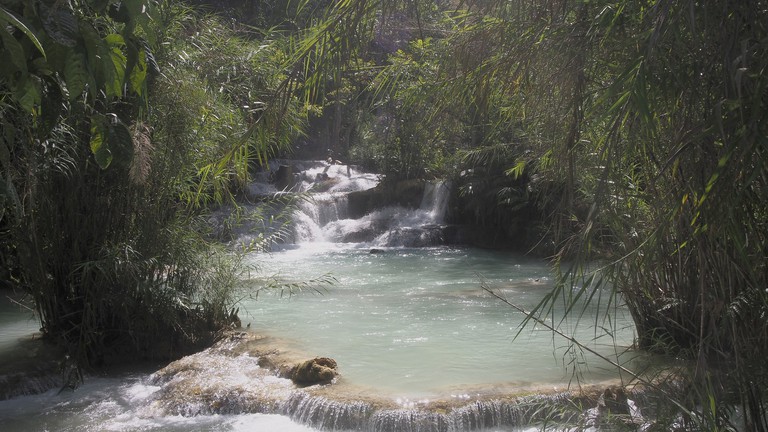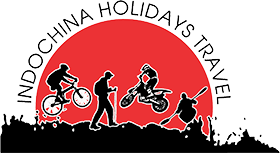Day 1 : Luang Prabang to Kiew Ka Cham (78Km) ( L,D )
Pick up at 7:30 from your hotel. After checking your bikes, depart from Luang Prabang and cycle the way to Kiew Ka Cham passing on the mountain road passing lush forest, and many small H’Mong villages that sit dwarfed by the amazing landscape of limestone mountains that surround them. Dinner and overnight in Kiew Ka Cham.
Day 2 : Kiew Ka Cham – Kasi (94 Km) ( B , L , D )
After breakfast, fill in water and be prepared to get on the bike. Today is the hard part of cycling with some up hills and down hills. So, we will start a bit early. You will be high in the mountains for the first half of the day following a ridge line up and down with peaks all around. In the afternoon it is time to relax a bit as the road is largely downhill along a valley to our overnight stop of Kase, a small village on top of the mountains.
Day 3 : Kasi – Vang Vieng (57 Km) ( B , L , D )
Cycle the 57km to Vang Vieng hopefully arriving early afternoon, spend, the afternoon to go caving or tubing on the Nam Song River or just relaxing. Then, the ride to Vang Vieng is a relatively easy day traveling through the lush greof rice fields. Vang Vieng is set in a prime location. Surrounded by, limestone peaks, caves, and rivers this town see its fair share of travelers, but for good reason. Overnight in Vang Vieng.
Day 4 : Vang Vieng – Phong Hong (Nam Ngum Lake) 85km ( B , L , D )
Spend the day cycling mainly downhill to Phong Hong and the Nam Ngum Lake, a man-made lake, formed by the damn. Dinner and spend the night near the lake.
Day 5: Nam Ngum Lake – Vientiane 85km ( B, L )
Cycling start from your hotel to Vientiane the road becomes mainly flat for this ride and you should be back in Vientiane. Explore the city and have dinner on your own. Overnight in Vientiane.
Day 6 : Vientiane Fly to Pakse ( B )
All-day free to explore city and driver pick up to the airport for flight to Pakse. Arrival check-in hotel.
Day 7 : Pakse – Bolaven Plateau (Tad Fan waterfal ( B , L , D )
An easy start to the day, after breakfast we ride from the hotel after 8 ka m on flat a road in town the road is sliguslog uphill to begin our journey the into coffee e growing area of Laos, the Bolaven plateau. After, a town we start to climb up into the temperate coffee growing area renowned for its Arabica and Robusta beans. These beans fetch some of the highest coffee prices in the world. The road undulates but has a definite upward feeling. As we climb, we see coffee everywhere as the plantations converge on the side of the road. We finish at the wonderful Tad Fane resort, which provides a stunning backdrop and the very impressive Tad Fane fall, if you are feeling energetic you can cycle to the other waterfall for swimming. Alternatively, you can relax in the restaurant and take the wonderful view. Dinner is at the resort
Elevation: Pakse = 170 m above sea level
Tadfan resort = 959 m above sea level.
Distance: 38 km (on good quality asphalt road but ascend)
Day 8: Tad Fane – Tad lo (Tad means water waterfall, L, D )
(Resort is at an altitude of 960 m above sea level)Today is the best rionnwritinghis trip, after 12 the climb we reach the top of Bolavene plateau (at an altitude of 1280 m above sea level). However, riding in the early morning makes you warm through the cold morning on the plateau, and you still have more energy in the morning, after a short break in a small town on together plate the au we continue our riding for another 38 km to a small town of Tha Teng (at an altitude of 860 m above sea level), this 38- kilomdescentecent is one of the rides ride in this trip, we have noodle soup for lunch at the local restaurant, 30 km from our destination, Tad Lor Resort (at an altitude of 750 m above sea level) Riding after lunch takes us very easy downhill but dirt road for 21 km to the junction, the rest of the road just 9 km on asphalt road and it is mainly flat. We check in the hotel in the afternoon and it is your time for swimming at the waterfall, relaxenjoyoying the, vierideiding around. Dinner is at the hotel.
Elevation: Departure point 959 m above sea level
Highest point: 1280 m above sea level
Arrival point: 346 m above sea level.
Ride: 80 km (12 km ascend, 68 km de, scend and flat, including 21 ka m on the dirt a road)
Day 9 : Tad Lor – Pakse – Champasak ( B , L , D )
After breakfast, we head towards Pakse. This road undulates and has a couple of lenclimbsclimb in it one of 5 km one of 49 km, but they are quite grduagradualore we turn right and head down way into Pakse. The last 2intoin to Pakse is downhill and can be covered quickly, be careful as we head into town as the traffic increases signisignificantlyter lunch in, a town we crisscross over the bridge to the right side or Thai side (but it is Lao territory ) we keep riding g on a flat road to the former southern kingdom of the land of million elephants, the present town of Champasak consist of a small settlement on the Thai side of the Mekong River, whose main interest of the visitors is its proximity to the famous Khmer site of Wat Phou, a name which indicates a connection with the ancient Cham kingdom, contemporaneous with the early Khmer empire.
Elevation: Tad Lor = 346 m above sea level
Highest point: 606 m above sea level.
Champasak = 124 m above sea level
Ride: 110 km on good quality asphalt road
Day 10 : Champasack – Khong Island (4000 islands) ( B , L , D )
Si Phan Done in Lao means 4000 islands; it is the widest and most charismatic part of the Mekong River and is our destination today. We leave as early as we can after breakfast, after 2 km of riding from the hotel, we cross the Mekong River on a very unusual mode of transport to the other side and after a short ride to the main road and then start heading soua th again towards Cambodia. Today is mainly flat with quiet road and some interesting scenery, we pass many villages with children standing in groups waving their hands saying say hello, it would be strange for them to see the tourists travel by bicycles (it feels hard for them).so we stop every 20 or 25 km for refreshments and we have lunch under the tree by the road when we feel like it. We then cross back over to the Mekong River to one of the big islands lands in the Mekong River, Kong Island (it is the hometown n of the former Lao president). We cycle a short way to our hotel. Dinner is in the hotel.
Elevation: Champasak =124 m above sea level
Khong island = 120 m above sea level.
Distance: 113 km (on good quality asphalt road, and mainly flat)
Day 11 : Khong island – Khone island ( B , L , D )
Today is a day to explore, we once again cross the river to mainland land and head south where we ride as far as on the main road, we turn to the village where the long-tail long-tail boat with all bikes, luggage, and our staff so we leave our support van at the village, we take a short boat trip to the small island of Don Det where we will have lunch. After lunch we ride along the old French Railway down to the beach where we get on small boats to Cambodian waters in search of fresh water Dolphins, After an hour we ride bathe k to the hotel at Don Khone is and., Distance: 30 km (Haft riding is on good quality asphalt road and the rest is on the path but ia t is fantastic stic ride and flat)
Dy 12: Donkhone Island – Cambodia -Stung Treng (80km (, L, D )
After breakfast boat rides the from the hotel to mainland land, we cycling cycle from the village to the main road and head south to the border, on the way stop at Khonphapheng waterfall, the biggest waterfall on the Mekong River aa after a short visit to the waterfall we cycle the rest to the border where you goodbye to Lao guide and driver, after immigration formalities in Lara s we take a short drive to Cambodian immigration where you meet Cambodian guide and driver to start your trip to Cambodia.
Day 13 : Stung Treng – Irrawady Dolphin – Kratie (75km( B , L , D )
Breakfast in Stung Treng. Cycle along the Mekong River on a dirt road for 30km. We transfer on the National Road as we cannot avoid this part. Cycle the last 45km on the back road along the Mekong River. The road is sealed but small with less traffic than the National road. It is also interesting to see the villages and scenery along the Mekong. We stop halfway to take the boat trip at Prek Kamp spot for efreshwaterresh water Irraway Dolphin. If you miss the chance to see the Dolphin at 4 Thousand Islands, you will be a bit le to see it at Prek Kampi for sure. After the boat trip, cycle the last 23km to Kratie. Dinner and overnight in Kratie.
Day 14: Kratie – Mondulkiri (Northern Hill Tribes Territory)(80k m)( B, L, D )
After breakfast, we transfer aboSeoulhours via Seoul to Keo Sima. Along the road, we can see some plantations initiated by the French. Then we start cycling with some uphills. The scenery after lunch is the best in Cambodia for cycling. We can view the pine forest and endless hill with green grass. We arrive in Mondulkiri and eck in the hotel. In the late afternoon, we cycle around the town and go on tells about 300 meters altitude high to view the sunset on top of meters at the Sea-Forest to see how amazing the nature is. Dinner and overnight in Mondulkiri.
Day 15: Sen Monorom – Bou Sra Water Fall (Cycling7 7m ) ( B, L, D )
Breakfast in Sen Monorom. Fill in the water, and start cycling out off Sen Monorom. Soon, we get to the dirt road passing the coffee plantation. We stop to have a quick visit at the plantation. Then continue on some of the sealed roads dirt roads through the jungle. Stop and relax to true the true nature. Then go to Bou Sra waterfall. Enjoy the lunch waterfall. Enjoy swimmiwaterfallwater fall and take some photos in Phnong minority clothes. Afternoon back to Sen Monorom for dinner and overnight
Day 16: Sen Monorom – Elephant Valley – Danrey Choun Wak 5km ( B, L, D)
Breakfast in Sen Monorom. Then we cycle 10km to Elephant Valley. This is a rescue center to protect the elephants from trafficking. You have a full-day full-day volunteer to work in this Elephant Valley to take care of the elephants. The staff at the project will on guide you how to do the job. Lunch at the valley. Dinner and overnight in Sen Monorom
Day 17: Mondulkiri-Chlong-Kampong Cham 8 5k m) ( B, L, D)
Breakfast at the hotel. Chalongnsfer to Chlong. Then start cycle ing along the Mekong River. This back road is nice for cycling to see the real-life experience of the local people who earn their living along the Mekong River. Most of them earn their living by farming and fishing. past cycle passes a few Muslim communities. Then we cross the Mekong River by ferrcommunitiesg Trong. Continue to cycle another 33km on some dirt roads and the sealed road to Kampong Cham. Dinner and overnight in Kampong Cham.
Day 18 : Kampong Cham – Phnom Penh – ( 40 km )( B ,L )
Breakfast at the hotel. Cycling and transfer by van to Phnomcheck-INR check in the hotel, and dinner explore by yourself – Overnight in Phnom Penh City
Day 19 :Cycle to Oudon 55km ( B , L )
Transfer tChhnangng Channing,8:00 Am Pick up from your hotel lobby and head straight out from Phnom Penh into the stunning landscapes of rice and coconut trees as we make our way to Oudong Mountain via Phnom Basset. We stop to enjoy fresh watermelon along the way as well as a range of other tasty local snacks. As the day wears on, we see a hill suddenly jut out of the completely flat countryside and this is Oudong, athe great place for a meal and a great place for a view of the plains. After lunch, we take a drive up Channing, the home of Cambodian ceramic pottery and genuine floating villages.O/N iChhnangng Channing.
Biking Distance: 5 km
Meals: L, D
Day 20 :Cycle Kampong Chanang & Battambang 40km
We start the day with a pedal arounChhnangng Channing to see what village life in this area means. We’ll see the pottery villages from which, terracotta pots of all sizes are distributed throughout Cambodia. We visit an abandoned airfield from the Khmer Rouge times and we might never n try out our hand at some farm work, time permitting. We then take a drive to Battambang, a rural center and home to some interesting french arch centers. We take an afternoon ride to see some of these buildings and then take a ride on the famous Bamboo Train.O/N in Battambang.
hiking Distance: 40 -55 k
Meals: B, L, D
Day 21 :Cycle Battambang – Siem Reap – 30km
Transfer to Siem Reap, As we wake on our third day, you will be wishing it not to end, but there is still time to learn about the village industries of Battambang, For this we meet up with a local university student who will show us around the villages just outside Battambang. The ride is on a lovely route along the river with lots of shade. We stop to see rice paper making, banana drying, riceprahokand prahok production, as well as a stop at the best snack of op in all of Cambodia, the kralanh shop. Here we try sticky rice with coconut and beans which are prepared in a bamboo tube. We return to town in the late morning and afmakeslunch make our way to Siem Reap in the support vehicle. The tour concludes with a drop-off at Siem Reap hotel
Biking Distance: 30 45 km
Meals: B,
Accommodation: Siem Reap Hotel 3 *
Day 22: Siem Reap – Tonle Sap Lake
Our guide the brief you on the biking loop at the hotel’s lobby and afterward start cycling to Me Chrey floating village through the rice paddies and Khmer tradition which usewhichre are located 20km from the town. On arrival at the pier, you’ll get a gentle kayak through the floating village where gentle be welcomed by warming smiles from the humble Cambodian people who live on this fantastic lake. You leisurely enjoy kayaking until reaching the end of the village and there you will be welcomed by our local host, a local lunch in a beautiful setting is ready for you. After a decent lunch, you’ll be taken for a soft adventure kayaking to the exotic mangroves in high water season (September – March) yet during low water season (April – August) you will kayak along the Tonle Sap Lake seeing rare birds in this tranquil setting giving you a once in a lifetime experience leavingeverlastinger lasting memories before transferring back by boat to the pier and again you will optionally cycle back to Siem Reap town.
Summardistance
Cyclin Distance: 4 km
Meals: Breakfast, Lunch, Dinner
Accommodation: Siem Reap Hotel 3 *
Day 23: Siem Reap – Angkor Temples
Today, a bit early breathe akfast at hot6:00 amend 6:00 am and then you will leave for the cycling tour to the temples of Angk6.30 amund 6.30 am. You start riding from the hotel to the temple ticket office and then off the road through the jungle to Phnom Bakheng mountain where the first visit Angkor Wat temple. It will take 1 hour to visit the Amazing temple which is the biggest religious building in the world and continue to ride to Banteay Kdei and Ta Prohm temples. a Lunch at a local restaurant and after lunch visit Preah Khan and Bayon temple in Angkor Thom City. Free afternoon in Siem Reap.
Summardistance
Cyclin Distance: 5km
Meals: Breakfast, Lunch
Accommodation: Siem Reap Hotel 3
Day 24: Siem Reap Departure ( B )
Transfer to airport for departure. Tour is Over
Please consider the environment before printing

